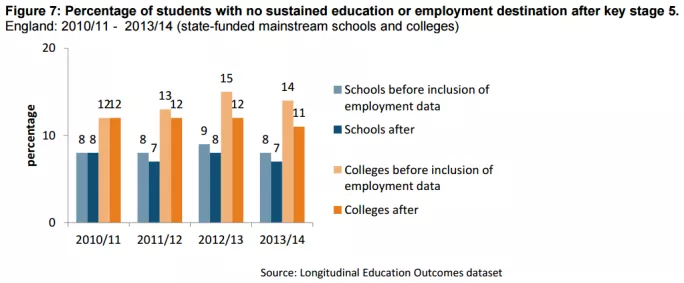The proportion of people leaving college after key stage 5 without a long-term place in education or employment has dropped, new government data shows, despite previous figures suggesting it had risen.
It had been assumed the number leaving colleges without a “sustained destination” had risen from 11 per cent in 2010-11 to 14 per cent in 2013-14.
However, the new data, which includes updated information on the employment status of former students, shows a downward trend from 12 to 11 per cent.
The inclusion of information from HMRC and the Department for Work and Pensions has also narrowed the gap between the college and the schools sectors.
Prior to the revision, schools were 11 percentage points ahead in terms of the proportion of pupils going into employment or education, but that figure is now just 4 per cent.
The new data shows the proportion of students in sixth-form and other further education colleges progressing to sustained destinations reached 87 per cent in 2013-14, compared with 91 per cent in mainstream state-funded school sixth forms.
Controversial figures
Destination figures are a commonly used measure to assess the effectiveness of the education system. However, they are not without controversy, with some concerned they may not capture the complete picture.
Elsewhere in the UK, they have even been called a “fraud”, with a Scottish education expert claiming the Holyrood government was including “dead-end jobs” in its positive destination figures.
Keir Bloomer, one of the architects of Scotland’s Curriculum for Excellence, said only “worthwhile employment” should be included in the statistics, and called for “more stringent criteria” to be introduced.
David Corke, director of education and skills policy at the Association of Colleges, said: “The latest set of destinations data demonstrates the significant impact that colleges have when it comes to students’ progress at the end of their course.
“The data is now more sophisticated because previously it was missing the information from HMRC. Including this data demonstrates how good colleges are at helping students get into sustained employment.”
Want to keep up with the latest education news and opinion? Follow TES FE News on Twitter, like us on Facebook and follow us on LinkedIn





